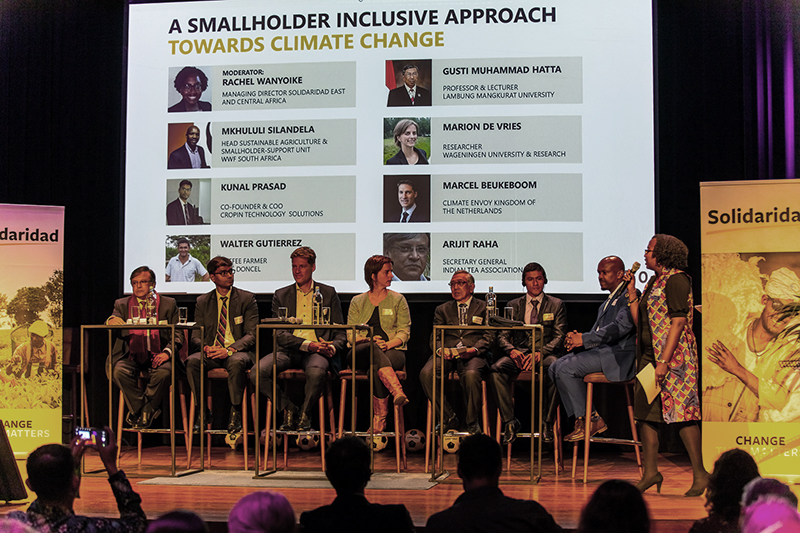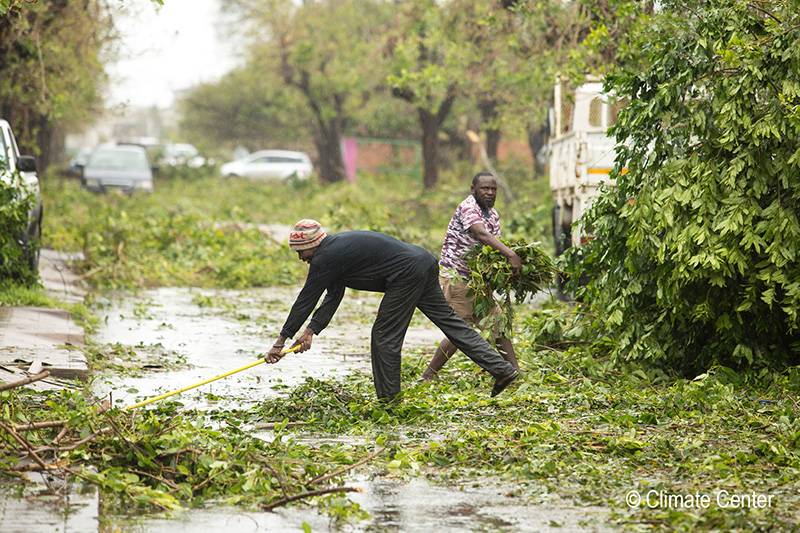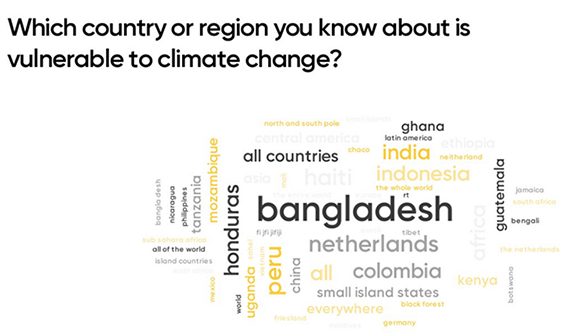Decoding the climate crisis
‘These answers don’t surprise me at all,’ stated Mkhululi Silandela in response to the results of the audience replies to the question: ‘Which part of the world is affected by climate change?’ Silandela is the Head of the Sustainable Agriculture and Smallholder-Support Unit of WWF in South Africa.
‘Of course the whole world is affected. However, what we see in South Africa is that not all smallholder farmers are aware of the problem. We need to decode the problem to them. It’s not enough to assume that they know what’s happening.’ Arijit Raha, Secretary General of the Tea Association in India, can relate. He witnesses first-hand the struggle of tea farmers with the new climate reality. ‘At this moment, we’re at 1.3 degrees temperature increase in some areas. We see a decrease of 200 millimeters in rainfall in a year.’ As a result, tea farmers have difficulty getting a good yield.
Kunal Prasad has extensive experience in knowledge transfer to farmers and confirmed that there is no easy way to reach out to them. ‘Many smallholder farmers grow different crops. To make them more resilient, we can’t only look from a crop perspective, we have to look at the whole farm. Technology plays a central role, for example, we use information provided by satellites about the status of fields. We synthesise all the information we have and create an advice on how to select the crop, plan their harvest and planting, etcetera. It doesn’t work to just send out advisors. We work with local institutions and they work together with the farmers. This has increased the percentage of farmers who have adopted the advice, and in comparison to other farmers, they have more productive fields.’

Landscape restoration
Preventing deforestation and planting new trees are vital elements in working on climate change mitigation. Smallholder farmers can play an important part is restoring landscapes. Gusti Muhammad Hatta, professor and lecturer at Lambung Mangkurat University in Indonesia, has seen this with his own eyes in West-Kalimantan. ‘In order to increase forest cover, the government gave smallholders the opportunity to grow fruit trees on new land. Every smallholder got 4 hectares. They cut some trees, but mostly they ended up collecting products like fruit and honey. Now, almost 400 of hectares of barren land has been covered by the trees.’
Global climate funds
The audience was asked whether or not they think global climate funds are succeeding in making smallholders resilient to climate change. The answer was an overwhelming ‘no’: 93% disagreed with the statement.
Marcel Beukeboom, Climate Envoy of the Netherlands, shared that it strikes him how little trust there is in what climate funds can achieve. Beukeboom serves as a thematic ambassador to the Netherlands, representing the kingdom when climate is discussed internationally. ‘International development assistance has been proven to show results. Last year, the Dutch development assistance contributed to 750.000 farmers to become more climate resilient. It also tells us that it is far from enough.’
Beukeboom continued: ‘Within the Paris Agreement, 100 billion euros of climate funding has been pledged, and that must be established from next year on. Another deal in the Agreement was that other financial flows have to be become ‘climate smart’. We all know that is not the case. At the same time, we now know that it is very well possible to have a profitable business and think about the consequences for global warming at the same time.’
Should smallholders think about limiting emissions?
The question was raised whether smallholder farmers have a responsibility to contribute to climate change mitigation. 67 percent of the audience indicated to think so. Walter Gutierrez agreed, saying that he has a responsibility to decrease emissions, just like everybody else. ‘We are trying to work in a better way. For example, now we’re avoiding water pollution as much as possible. But we do need a better price for our product to implement improvements. The price I’d get for organic coffee, is the same as I’d get for non-organic coffee.’
Marion de Vries, who works as a Livestock Systems and Environment Researcher of the Wageningen University in the Netherland states: ‘The numbers are not undisputed, but it looks like a third of the worldwide greenhouse emissions from agriculture come from smallholder farms. That’s significant. The majority is caused by livestock, especially cattle. And the demand for livestock products is increasing.’
De Vries subsequently explained several strategies to limit the emissions of smallholders farmers. ‘Depending on the local possibilities, smallholders can adopt better agricultural practices, such as better feeding and breeding. Another potential improvement can be realized by feeding additives that reduce belching of the powerful greenhouse gas methane (CH4), which is a bit more high-tech and costly. They can also capture emissions, for example, from manure storages. Furthermore, we need structural changes, such as looking at the number of animals we host at our globe.’ De Vries stressed that mitigation measures ideally go hand in hand with climate change adaptation.

What Solidaridad must do
Solididad works all over the world with farmers like Gutierrez, providing more than just training in climate smart farming strategies. A good price for their product and financing opportunities to pay for the needed adjustments are crucial. Beukeboom explained: ‘Climate change is part of a system that’s not fair. We need a healthy balance between producers, consumers and buyers that includes a fair price for the products.’
This panel discussion took place at the birthday party of Solidaridad, so it was the appropriate platform to discuss the role of Solidaridad in making smallholders more climate resilient. Several panel members agreed that the crucial role of Solidaridad lies in providing the eyes and ears on the ground for their company or institute. In the coming 50 years, we can expect climate change to become a crucial theme in improving the livelihoods of smallholder farmers. Solidaridad is needed to work directly with farmers and share the lessons learnt with all the involved stakeholders.

